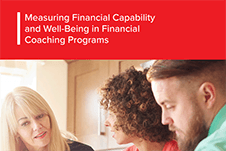Discover financial empowerment resources
Discover financial empowerment resources
This brief describes the data collected and lessons gleaned from the Financial Coaching Impact & Evaluation Fellowship, which took place over the course of 10 months in 2017. Ultimately, this brief argues that the Financial Well-Being Scale and the Financial Capability Scale are promising...

This brief is the fourth of a five-part series that highlights the need and opportunity for integrating financial capability services into social service programs. The goal of this integration is to improve overall financial outcomes that lead to financial security for low- and moderate-income...
This brief uses the experiences of participants in a service design process called the Savings Innovation Learning Cluster (SILC) to gather key insights into client perspectives and how it can be used to better program design. Four human insights research and design methods are explored—client...

From January 2014 through June 2015, ten community-based organizations from around the United States embarked on an 18-month journey to develop new ways for their low-income clients to progress toward financial security. This document highlights the lessons and successes from that Learning Cluster...
Indicators are the data that help you assess whether or not you are on track to achieve the desired results identified in your logic model. They are also useful to communicate your program’s potential impact to funders and stakeholders. Programs that consistently collect and review data to track...
A well-designed logic model can provide the foundation to support your efforts to collect the data necessary to answer important questions about the performance of the program. A logic model can be developed and formatted in many ways. In this document, we are not prescribing the “best...
